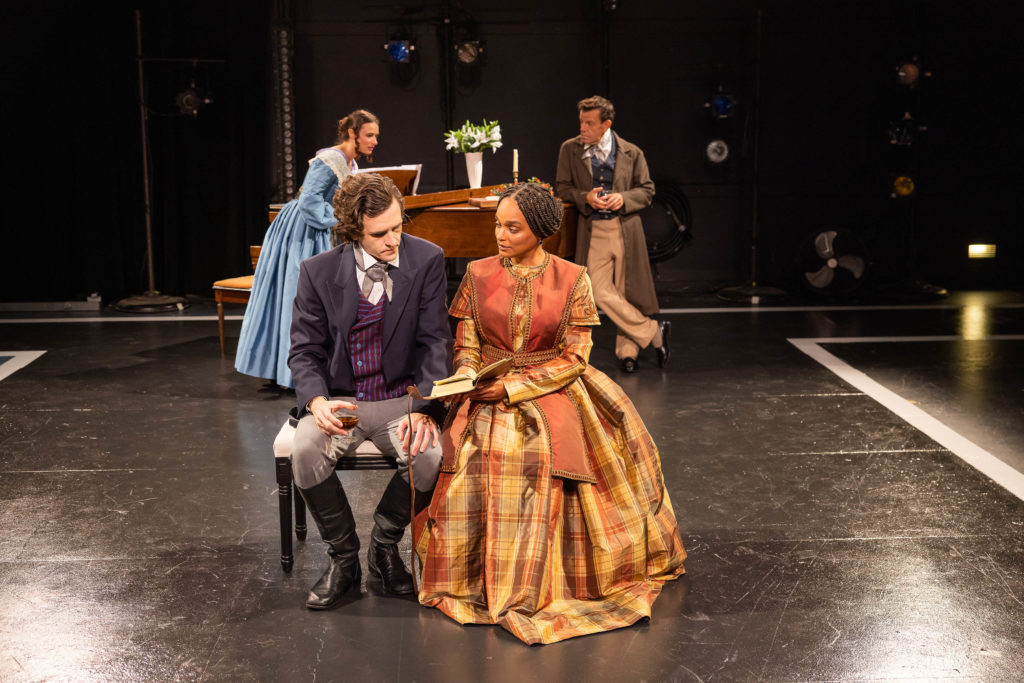
Presented by Central Square Theater
Brit d’Arbeloff Women in Science Production
A Catalyst Collaborative@MIT Production
Written by Lauren Gunderson
Directed by Debra Wise
Choreography by Judith Chaffee
Featuring Kortney Adams, Diego Arciniegas, Mishy Jacobsen, and John Hardin
The online playbill
September 22 to October 23, 2022
Central Square Theater
450 Massachusetts Avenue
Cambridge, MA
Critique by Kitty Drexel
CAMBRIDGE, Mass. — Lauren Gunderson’s Ada and the Engine at Central Square Theater is not either’s best work. Central Square Theater has produced better shows and produced better shows by Gunderson. Gunderson has written better plays.
Ada and the Engine is problematic, and the script has problems. It reorganizes the life of English mathematician Augusta “Ada” King, Countess of Lovelace to tell a unique story about the intersection of computational science and gender roles. It approximates Ada Lovelace’s life to continue the discussion about the uphill battle women face in STEM.
Gunderson takes liberties with Lovelace’s biography (like one does). It isn’t so much the story of Lovelace’s scientific achievements as it is speculation for entertainment’s sake. If you enjoyed Amadeus by Peter Shaffer, or Baz Luhrman’s Elvis, you’ll get a kick out of Ada and the Engine.
Here’s a list of reasons why Ada and the Engine doesn’t work:
- Ada Lovelace lived a scandalous life. Gunderson could have plumbed Lovelace’s actual biography to show us Lovelace’s many gambling debts, her pre- and extra-marital affairs, and other social taboos. Gunderson skims the surface of Lovelace’s activities via conversations about disparate topics to focus instead on her own agenda.
- Gunderson shows us very little about Lovelace… Or, Babbage, Lord Lovelace, or Anne Isabella Millibanke. Gunderson tells us instead. There is so much telling that even the fancy difference engine prop with its cranks and wheels isn’t seen in motion. It’s very Tom Stoppard-y.
- Gunderson doesn’t trust her audience to understand the science. Whether intentional or not, she mansplains even basic scientific concepts. It’s rude.
- It is hinted, but not directly stated, that the Ada Lovelace character in this production is on the autism spectrum. The character Lovelace is written as too socially sophisticated to be on the spectrum. Gunderson doesn’t show Lovelace masking or having meltdowns. Lovelace has a direct conversation style but that is not enough evidence to diagnose her. There is no proof that Lovelace (or her father) was on the spectrum. To speculate that she was without proof is harmful.
- The themes of Ada and the Engine overwhelm the details about Lovelace’s personal struggle. Lovelace is an excuse for the play and not the reason for it.
Here are the ways that Debra Wise and the Cast and crew of Ada and the Engine salvaged this production:
- There were many distractions on Thursday night: high school students kept accidentally but loudly dropping things; three adults using assisted listening devices left early, but only after discussing it during the first act first; a couple weren’t enjoying themselves in our section and made sure we all knew it. The cast kept going. They behaved admirably you wouldn’t have known that night’s audience was full of interrupting cads.
- The tech person acting as properties run crew for Thursday’s performance brought their A-game. Run crew often does behind-the-scenes work so they don’t have to be on the stage. The uncredited tech person had good energy while successfully ceding the stage to the actors.
- Ada Lovelace is not an Everywoman but Mishy Jacobson lent herself well to the task of making Gunderson’s character relatable. Jacobson inhabits the emotional center of the play and exudes compassion for the characters caught up in the play’s politics.
- Diego Arciniegas is so profoundly perfect as Charles Babbage that even the most utterly ridiculous parts of the play have depth.
- Ada and the Engine shows us an inkling of Gunderson’s genius to come: The Half-Life of Marie Curie, The Catastrophist, Exit, Pursued by a Bear, Silent Sky. That’s a good reason to see Central Square’s production. It’s not enough reason to think uncritically.

The cast; Nile Scott Studios.
I had a great time watching Ada and the Engine. It wasn’t until after the show that I began to feel uneasy about what I saw. I listened to my intuition and, armed with the understanding that a basic search isn’t “research,” I Googled Ada Lovelace. I found this Gizmodo article, this Wired article, and the History.com page.
Debra Wise’s thoughtful “From the Director” note tells us that this play is based on historical characters. “Based on” is code for “a fictional account.” Wise warns us, but I still felt deceived.
This perceived fault has affected my critique. I went to Ada and the Machine, got swept away by their story, and discovered it was all a ruse within a ruse to tickle my heartstrings. Now my ego is wounded. That must be how Lovelace felt when she trusted Babbage with her life’s work and the world callously tossed it aside… Perhaps this play is effective after all.
Ada and the Engine is a tragedy. By watching it, we can empathize with all the women whose careers and lives were hacked short by the contents of their underpants. Men don’t have to reconcile their passions with their genitals. They have never had to. Women still do.
“Some boys take a beautiful girl
And hide her away from the rest of the world
I wanna be the one to walk in the sun/Oh girls, they wanna have fun
Oh girls just wanna have (fun)”
-Cyndi Lauper, “Girls Just Want To Have Fun”
